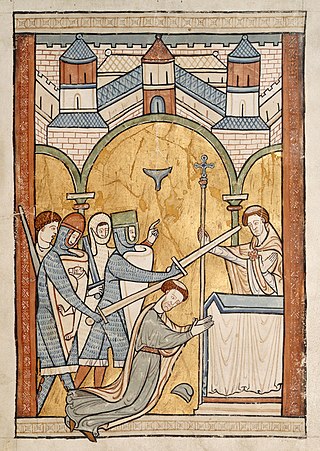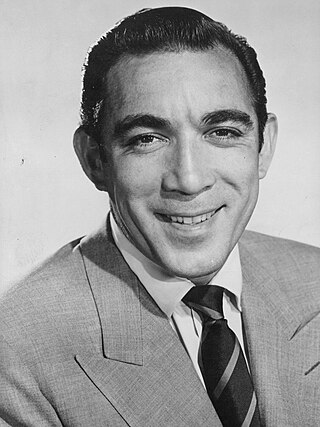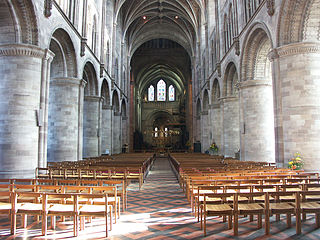Related Research Articles

Thomas Becket, also known as Saint Thomas of Canterbury, Thomas of London and later Thomas à Becket, served as Lord Chancellor from 1155 to 1162, and then notably as Archbishop of Canterbury from 1162 until his death in 1170. He engaged in conflict with Henry II, King of England, over the rights and privileges of the Church and was murdered by followers of the King in Canterbury Cathedral. Soon after his death, he was canonised by Pope Alexander III. He is venerated as a saint and martyr by the Catholic Church and the Anglican Communion.

Manuel Antonio Rodolfo Quinn Oaxaca, known as Anthony Quinn, was an American actor. He was known for his portrayal of earthy, passionate characters "marked by a brutal and elemental virility" in over 100 film, television and stage roles between 1936 and 2002. He was a two-time Academy Award winner, and was also nominated for five Golden Globe Awards, two BAFTA Awards and a Tony Award.
Becket or The Honour of God, often shortened to Becket, is a 1959 stage play written in French by Jean Anouilh. It is a depiction of the conflict between Thomas Becket and King Henry II of England leading to Becket's assassination in 1170. It contains many historical inaccuracies, which the author acknowledged.

Murder in the Cathedral is a verse drama by T. S. Eliot, first performed in 1935. The play portrays the assassination of Archbishop Thomas Becket in Canterbury Cathedral during the reign of Henry II in 1170. Eliot drew heavily on the writing of Edward Grim, a clerk who was an eyewitness to the event.
Richard was a medieval Benedictine monk and Archbishop of Canterbury. Employed by Thomas Becket immediately before Becket's death, Richard arranged for Becket to be buried in Canterbury Cathedral and eventually succeeded Becket at Canterbury in a contentious election. Much of Richard's time as archbishop was spent in a dispute with Roger de Pont L'Evêque, the Archbishop of York over the primacy of England, and with St Augustine's Abbey in Canterbury over the archbishop's jurisdiction over the abbey. Richard had better relations with King Henry II of England than Becket had and was employed by the king on diplomatic affairs. Richard also had the trust of the papacy and served as a judge for it. Several of his questions to Pope Alexander III were collected into the Decretals, a collection of ecclesiastical laws, and his patronage of canon lawyers did much to advance the study of canon law in England.

Roger de Pont L'Évêque was Archbishop of York from 1154 to 1181. Born in Normandy, he preceded Thomas Becket as Archdeacon of Canterbury, and together with Becket served Theobald of Bec while Theobald was Archbishop of Canterbury. While in Theobald's service, Roger was alleged to have committed a crime which Becket helped to cover up. Roger succeeded William FitzHerbert as archbishop in 1154, and while at York rebuilt York Minster, which had been damaged by fire.

Reginald Fitz Jocelin was a medieval Bishop of Bath and an Archbishop of Canterbury-elect in England. A member of an Anglo-Norman noble family, he was the son of a bishop, and was educated in Italy. He was a household clerk for Thomas Becket, but by 1167 he was serving King Henry II of England. He was also a favourite of King Louis VII of France, who had him appointed abbot of the Abbey of Corbeil. After Reginald angered Becket while attempting to help negotiate a settlement between Becket and the king, Becket called him "that offspring of fornication, that enemy to the peace of the Church, that traitor." When he was elected as a bishop, the election was challenged by King Henry's eldest son, Henry the Young King, and Reginald was forced to go to Rome to be confirmed by Pope Alexander III. He attended the Third Lateran Council in 1179, and spent much of his time administering his diocese. He was elected Archbishop of Canterbury in 1191, but died before he could be installed.

Josceline de Bohon or Bohun was an Anglo-Norman religious leader.
The 37th Academy Awards were held on April 5, 1965, to honor film achievements of 1964. The ceremony was produced by MGM's Joe Pasternak and hosted, for the 14th time, by Bob Hope.

Gilbert Foliot was a medieval English monk and prelate, successively Abbot of Gloucester, Bishop of Hereford and Bishop of London. Born to an ecclesiastical family, he became a monk at Cluny Abbey in France at about the age of twenty. After holding two posts as prior in the Cluniac order he was appointed Abbot of Gloucester Abbey in 1139, a promotion influenced by his kinsman Miles of Gloucester. During his tenure as abbot he acquired additional land for the abbey, and may have helped to fabricate some charters—legal deeds attesting property ownership—to gain advantage in a dispute with the Archbishops of York. Although Foliot recognised Stephen as the King of England, he may have also sympathised with the Empress Matilda's claim to the throne. He joined Matilda's supporters after her forces captured Stephen, and continued to write letters in support of Matilda even after Stephen's release.

Becket is a 1964 British historical drama film about the historic, tumultuous relationship between Henry II of England and his friend-turned-bishop Thomas Becket. It is a dramatic film adaptation of the 1959 play Becket or the Honour of God by Jean Anouilh made by Hal Wallis Productions and released by Paramount Pictures. It was directed by Peter Glenville and produced by Hal B. Wallis with Joseph H. Hazen as executive producer. The screenplay was written by Edward Anhalt based on Anouilh's play. The music score was by Laurence Rosenthal, the cinematography by Geoffrey Unsworth and the editing by Anne V. Coates.
Peter Glenville was an English theatre and film director, and actor. He was a prominent director of stage plays on the West End and Broadway in the 1950s. He was nominated for four Tony Awards for his American plays.

Hilary was a medieval bishop of Chichester in England. English by birth, he studied canon law and worked in Rome as a papal clerk. During his time there, he became acquainted with a number of ecclesiastics, including the future Pope Adrian IV, and the writer John of Salisbury. In England, he served as a clerk for Henry of Blois, who was the bishop of Winchester and brother of King Stephen of England. After Hilary's unsuccessful nomination to become Archbishop of York, Pope Eugene III compensated him by promoting him to the bishopric of Chichester in 1147.
William of Northall was a mediaeval Bishop of Worcester.
Henry II ruled as King of England from 1154 to 1189 and at various times he also partially controlled Scotland, Wales, Ireland and the Duchy of Brittany. He has been depicted in various cultural media.
Melvin Howard Becket, was an American college football and professional Canadian football player, and was one of 62 people who died on Trans-Canada Air Lines Flight 810, on December 9, 1956.
Albert Victor Bramble (1884–1963) was an English actor and film director. He began his acting career on the stage. He started acting in films in 1914 and subsequently turned to directing and producing films. He died on 17 May 1963.
Becket is a 1924 British silent drama film directed by George Ridgwell and starring Frank R. Benson, A.V. Bramble and Bertram Burleigh. It depicts the fatal encounter between Henry II and the Archbishop of Canterbury Thomas Becket.

The Angevin kings of England were Henry II and his sons, Richard I and John, who ruled England from 1154 to 1216. With ancestral lands in Anjou, they were related to the Norman kings of England through Matilda, the daughter of Henry I, and Henry II's mother. They were also related to the earlier Anglo-Saxon kings of England through Matilda's great-great grandfather, Edmund Ironside. Their descendants, the main line of Plantagenets, continued to rule England until 1485; some historians make no distinction between the Angevins and the Plantagenets, while others name John's son Henry III the first Plantagenet king.

"Will no one rid me of this turbulent priest?" is a quote attributed to Henry II of England preceding the death of Thomas Becket, the Archbishop of Canterbury, in 1170. While the quote was not expressed as an order, it prompted four knights to travel from Normandy to Canterbury, where they killed Becket due to an ongoing dispute between crown and church. The phrase is commonly used in modern-day contexts to express that a ruler's wish may be interpreted as a command by his or her subordinates. It is also commonly understood as shorthand for any rhetorical device allowing leaders to covertly order or exhort violence among their followers, while still being able to claim plausible deniability for political, legal, or other reasons.
References
- ↑ Shirlee Emmons; Wilbur Watkins Lewis (22 December 2005). Researching the Song:A Lexicon. Oxford University Press, USA. pp. 443–??. ISBN 978-0-19-803469-8.
- ↑ Low p. 127
- ↑ Low p. 264